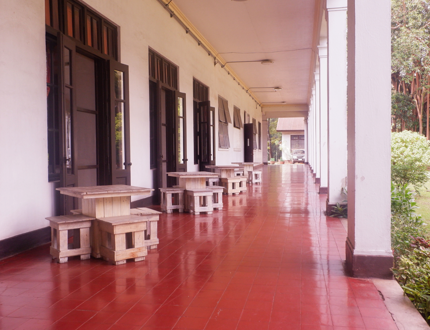
The Retreat
Come away to a quiet place and rest awhile.
The Retreat

By the term Spiritual Exercises we mean every method of examination of conscience, meditation, contemplation, vocal or mental prayer, and other spiritual activities. For example, just as taking a walk, traveling on foot, and running are physical exercises, so is the name spiritual exercises given to any means of preparing and disposing our soul to rid itself of all its disordered affections and then, after their removal, of seeking and finding the will of God in the ordering of our life for the salvation of our soul. To overcome oneself, and to order one’s life, without reaching a decision through some disordered affection. (That) I may become able to love and serve his Divine Majesty in all things.
LEARN MOREWhy is it made in seclusion?
Ordinarily, in making the Spiritual Exercises an exercitant will achieve more progress the more he or she withdraws from all friends and acquaintances, and from all earthly concerns; for example, by moving out of one’s place of residence and taking a different house or room where he can live in the greatest possible solitude, and thus be free to attend Mass and Vespers daily without fear of hindrance from acquaintances. Three principal advantages flow from this seclusion, among many others.
First, by with withdrawing from friends and acquaintances and likewise from various activities that are not well ordered, in order to serve and praise God our Lord, we gain much merit in the eyes of his divine Majesty.

Second, by being secluded in this way and not having our mind divided among many matters, but by concentrating instead all our attention on one alone, namely, the service of our Creator and our own spiritual progress, we enjoy a freer use of our natural faculties for seeking diligently what we so ardently desire.

Third, the more we keep ourselves alone and secluded, the more fit do we make ourselves to approach and attain to our Creator and Lord; and the nearer we come to him in this way, the more do we dispose ourselves to receive graces and gifts from his divine and supreme goodness.




Who is St. Ignatius of Loyola?
How might St. Ignatius, the patron saint of those making a retreat, answer these questions? What did he say in his retreat guidebook (which was more a director’s guidebook than the retreatant’s), the Spiritual Exercises? A good way to get to his mind on the matter is to reflect on his own words and see how they may relate to one’s situation.
Thus, the saint’s own words are given below without any comment. However, there are a couple of things that need to be said to properly appreciate what he said. First, he was mainly talking about the 30-day retreat. Second, he clearly looked upon the 30-day retreat as exemplar for other retreat-situations. Thus, he expected the director (whom he called giver of the Exercises), to adapt the Exercises according to where his or her exercitant (we say, retreatant) might be.

St. Ignatius of Loyola
What is the role of a director?
The one giving the Exercises ought to allow the Creator to deal immediately with the creature and the creature with its Creator and Lord. Exercitants should be given, each one, as much as they are willing to dispose themselves to receive, for their greater help and progress.
What is the disposition needed in making it?
The persons who receive the Exercises will benefit greatly by entering upon them with great spirit and generosity toward their Creator and Lord, and by offering all their desires and freedom to him so that his Divine Majesty can make use of their persons and of all they possess in whatsoever way is according to his most holy will.
What prayer expresses the grace one seeks in a retreat?
(In the Contemplation To Attain Love, St. Ignatius asked the retreatant to say this prayer):
Take, Lord, and receive all my liberty, my memory, my understanding, and all my will - all that I have and possess. You, Lord, have given all that to me. I now give it back to you, O Lord. All of it is yours. Dispose of it according to your will. Give me your love and your grace. For this is enough for me.